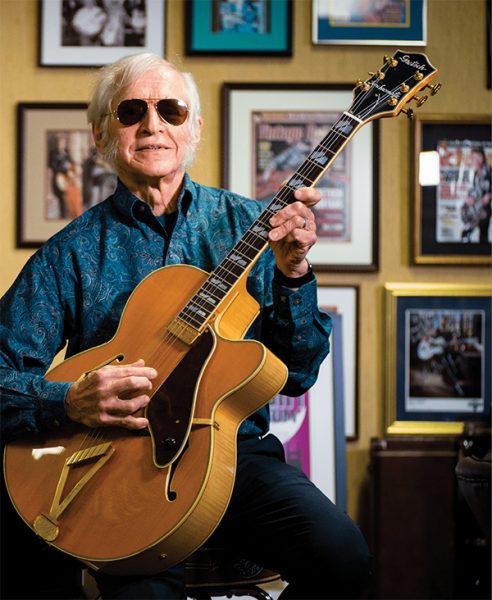A Sound Like No Other
Historic Gift and Partnership Establishes the Fred and Dinah Gretsch School of Music at Georgia Southern

If you’ve listened to music in the last 138 years, there’s a good chance you’ve heard “that great Gretsch sound.”
Drummer Jimmy Cobb played a Gretsch kit on Miles Davis’ “Kind of Blue” — a jazz classic. Chet Atkins recorded his influential country album, “Mister Guitar,” on a Country Gentleman guitar — his signature model. Atkins fan George Harrison played the same model on several Beatles albums, and Rolling Stones drummer Charlie Watts carried the backbeat on every record playing Gretsch kits.
And now, the Gretsch name, international reputation, and more than a century of history are joined with Georgia Southern in the Fred and Dinah Gretsch School of Music.
In February, the Gretsch family made a significant donation to the University, along with the Gretsch Collection of historic drums, guitars and company archives, a collection worth millions that tells the story of music in America.
“The generosity and vision of this transformational gift from Fred and Dinah Gretsch is truly a milestone in Georgia Southern’s history — for the University, for the communities we serve and for our school of music,” said Georgia Southern University President Kyle Marrero. “This collaboration with the Gretsch family, the Gretsch Company and its commitment to excellence exemplifies our goal to elevate and further enhance extraordinary programs, like our music program at Georgia Southern.”
For the Gretsch family, the gift is part of a more personal mission.
“We have a family goal to enrich lives through participation in making music,” said Fred Gretsch, who runs the company with his wife, Dinah. “So our goal would be more people in this part of the world will get a chance to participate in making music — that Georgia Southern will spearhead a community of music-loving people of all ages to experience music, to improve their talent in music making and, like Mrs. Gretsch and I have, make a career out of the music industry.”
THE “E” GENE
Gretsch is the great-grandson of Friedrich Gretsch, a German immigrant and entrepreneur who founded the company in 1883. It started as a music store in Brooklyn, New York, where he built handmade banjos, drums and tambourines in a small workshop. By 1920, Gretsch was recognized as the largest manufacturer of musical instruments in the United States.
Today, the family-owned company is based in Pooler, Georgia, and still recognized as one of the music industry’s most influential and innovative instrument manufacturers, with some of the most respected names in music as its devotees.
When you ask Fred Gretsch about his own musical ability, however, he’ll tell you he didn’t get “the A gene” — the artistic gene — from his great-grandmother, who was a pianist. He did, however, get “the E gene” — the entrepreneurial gene — from his great-grandfather and his grandfather and his father who led the company through its history.
The company remained in the family until 1967, when Gretsch’s uncle, Fred Gretsch Jr., retired and negotiated a sale of the company to Baldwin Piano Company. “It was my goal to buy the business back again,” said Gretsch. “It took 17 years to do it. In 1984, Mrs. Gretsch and I bought the business back again.”
The Gretsch Company was the first to create a “warp-free,” multi-ply drum hoop — a process pioneered by Fred Gretsch Sr., who took over the company in 1895, when he was only 15 years old. They’ve created specialty guitars for the likes of blues legend Bo Diddley and Billy Gibbons of ZZ Top, rock icons like Stephen Stills of Crosby, Stills and Nash, and Malcolm Young of AC/DC.
In their Pooler, Georgia, headquarters, the studio walls are lined with photos of stars in the Gretsch roster. In a recent tour of the studio, a visitor noticed a small, framed photo on a shelf, among old books, magazines and instruments. In the photo was Johnny Ramone of the Ramones, Eddie Vedder of Pearl Jam and Billy Zoom, guitarist for the punk rock band X.
“Do you know those guys?” he asked.
Gretsch saw the photo and said, “Oh, yeah. You know, Billy has always played Gretsch guitars. He and his wife came down for Dinah’s 40th Anniversary that we celebrated in West Lake Village, California, in 2019. Really nice guy.”
A REALLY BIG DEAL
Steven Harper, chair of Georgia Southern’s music department, said he can’t overstate the importance of this partnership with Gretsch.
“I mean, it’s always a big deal to have a school of music named,” he said. “Obviously, it involves a lot of money and a lot of commitment, and the Gretsches have been big advocates for universal music education for decades. Fred and Dinah Gretsch — these are international figures. The Gretsch name is known all over the world. It’s a really big deal for us.”
As part of the agreement, Georgia Southern is establishing the Fred and Dinah Gretsch School of Music Performance Stage at the Atlantic Building of the new downtown Plant Riverside District in Savannah. The building will feature exhibit space that will highlight Gretsch instruments. Similar exhibits will be planned at the Georgia Southern Museum in Statesboro, as well as the Fine Arts Hall at the Armstrong Campus, and can be packaged for partner shows around the world.
The agreement will also create several new positions at the University. The Distinguished Scholar in Guitar/Music Industry will be an assistant professor in the new music industry program who will also work with the museum and library to document, curate and promote the Gretsch Collection. The Gretsch Collection Curator of Permanent Collections will manage the collection in all aspects of cataloguing, registration, maintenance and upkeep, and will hire a project archivist and two graduate assistantships to help with the process.
What does all this mean for the school of music at Georgia Southern? Harper anticipates the school will be double, even triple its current size 10 years from now.
“On the Armstrong Campus, a lot of that is going to be driven by the music industry program,” he said. “In Statesboro, that’s going to be driven by the more traditional things. We’ve always been a really important music education school. Our graduates are highly sought after in the state. Now, there’s an opportunity to vastly increase what we’re able to do.”
For Gretsch, the partnership is all about continuing the story of music. Many critics have decried the end of the music industry as digital distribution and the decentralization of music production puts music in the hands of music professionals, novices and hobbyists alike.
The way Gretsch sees it, though, there will always be a market for music — not because of distribution, but for how it makes us feel.
“It’s a new world and a new wave,” said Gretsch. “But the interesting thing through it all — the value of music, how we feel about it, is still the same. And the traditional music of the masters is still highly valued.
“So, how long will the drum business and the guitar business be around? Well, it will be around as long as the music is popular. And I daresay the music will be popular a hundred years from now, no different than Mozart and Beethoven.
“They’ll be around, too…just different people listening to it.”
— Doy Cave
